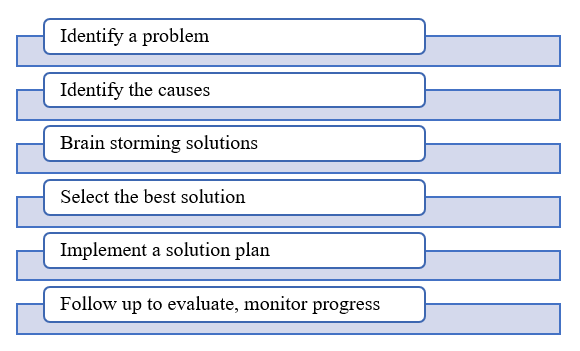Critical Thinking - the Art of Thinking About Thinking


*"It is the mark of an educated mind to be able to entertain a thought without accepting it." Aristotle. *
In the last 10 years, the world of education has seen a big shift. New challenges like Covid 19, have changed a lot of things that we have perceived for so long and have forced us to find new ways of doing things. However, even in this dynamic phase, certain fundamental elements of education have stood the test of time. One of those elements is Critical Thinking Skills.
What is Critical Thinking?
Critical thinking has been called “the art of thinking about thinking” (Ruggiero, V.R., 2012) with the intent to improve one’s thinking. It is a mental process of actively and skillfully conceptualizing, applying, analysing, synthesizing, and evaluating information to form an informed opinion. In other words, critical thinking “is about being an active learner rather than a passive recipient of information.”
Need to develop Critical Thinking
The core concept of critical thinking is to promote creative thinkers, decision-makers, problem-solvers, and self-sustained citizens. This is the need of the day as well! On the other hand, the National Education Policy (NEP) 2020 also emphasizes the development of 21st-century skills. The most important 21st-century skills can be identified as 4C’s – Critical thinking, Creativity, Collaboration, Communication, and Usability. Only through developing critical thinking, can we move towards liberal education which focuses on training every individual how to think rather than what to think.
The process involved in developing Critical Thinking.
Critical thinking and problem-solving are the two faces of a coin. During problem-solving, the students are exposed to various steps and strategies that enable a child to think critically. The important steps are as follows:

Critical Thinking skills strengthen and mould an individual to build a strong personality.
It involves improvising the following skills -
1. Problem solving - ability to solve complex problems
2. Decision-making – the ability to make the right decision based on facts and strong reasons,
3. Analytical skills – the ability to analyse data to draw conclusions from the observations made
4. Reasoning skills – ability to analyse, evaluate and synthesise
5. Evaluating skills – the ability to judge the quality of arguments and the credibility of speakers and writers
5 Simple ways to foster critical thinking in your child at home
One must understand the importance of critical thinking and how it entails analytical skills as well before you actually foster critical thinking skills in your child. Give examples and make them realise that without making a diagnosis, and collecting data and evidence to prove the diseases doctors won’t be able to give solutions for a problem. The same goes with a judge or a lawyer. So, for any matter there should be a deeper understanding of the concepts and a set of skills, then one will be in a better position to find out the solution. As a parent, what is your role? How will you help your child to develop critical thinking skills?
A few important tips are as follows
1. Ask open-ended questions - Value their thoughts and allow the child to respond without any restrictions. If the child comes up with the wrong answer, guide them to attempt the questions again.
**For example: Inadequate food consumption is the reason for poor development in some countries.
How far do you agree with the statement? Justify your answer
Key factor: Inadequate food consumption (it means there’s a food shortage hence leading to malnutrition and starvation)
Issue: poor development in some countries
Perspectives to discuss/ different solutions: Other reasons to be considered Overconsumption also leads to obesity and affects the development of a body.
Some students may also come up with an increase in population that leads to inadequate food supply to the citizens and leads to poor development in some countries.
2**. Allow the child to connect different ideas and examine relationships between them**
For example, how do lifestyle and eating habits affect our health?
3**. Examine different points of view.**
For example, why is the circuit not working?
Check whether the problem is with the power supply, wires, switch or bulb.
4. Challenge them to come up with different solutions or to be creative
Give some materials and ask them to come up with some models in science or give a topic and ask them to give a creative catchy slogan or caption to it. Ask them to find out a creative solution.
5**. Group discussion/Teamwork**
Allow your kids to work with friends or siblings in teams, this helps in collaborative learning. This also helps the child to respect each one's thoughts and perspectives.
Implementation of Critical Thinking in Learning for Life (LFL) Curriculum at Glentree Academy.
- One of the important aspects of our Glentree schools is to provide a well-planned and progressive curriculum. Science is any system of knowledge that is concerned with the physical world and its phenomena and that entails unbiased observations and systematic experimentation. As the definition of science touches all the steps of critical thinking, there are a lot of scopes to develop it during science classes. All the lesson plans, projects, and Glennovator Science Kit Activities follow various approaches such as problem-solving, inquiry-based learning, etc. These approaches are child-centred and provide a platform to understand the concepts scientifically. Students are exposed to various challenges and activities are done to spark their curiosity. Asking questions, experimenting with the outcomes, and exploring the possibilities are the paths that are followed in designing every lesson plan to enhance the critical thinking skills of every child.
Conclusion
Critical thinking skills cannot develop in a day or two. It is an ongoing process. Let the school and parents join hands and work as a team to ensure that the upcoming generation is curious, open-minded, critical thinkers, analytical, reflective, and decisive. After all, those are the traits of a confident individual, isn’t it?
